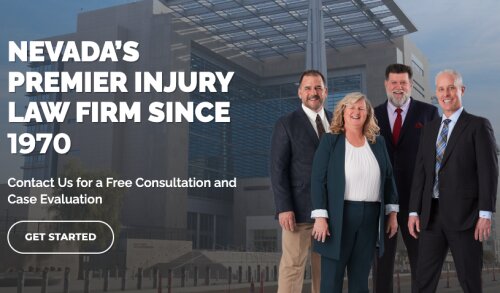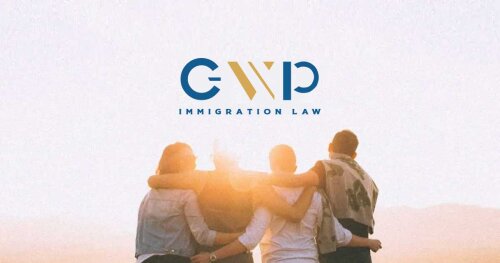Best Sexual Harassment Lawyers in Las Vegas
Share your needs with us, get contacted by law firms.
Free. Takes 2 min.
List of the best lawyers in Las Vegas, United States
About Sexual Harassment Law in Las Vegas, United States
Sexual harassment in Las Vegas is governed by a combination of federal law, Nevada state law, and local policies that apply to workplaces, schools, housing, and public accommodations. Federal law - primarily Title VII of the Civil Rights Act of 1964 - prohibits sexual harassment in employment by employers meeting federal coverage thresholds. Nevada state law and state agencies provide additional protections and complaint procedures. Sexual harassment can be verbal, visual, or physical conduct of a sexual nature that creates a hostile, intimidating, or offensive environment or that affects employment decisions such as hiring, promotion, or termination.
Why You May Need a Lawyer
People seek legal help for sexual harassment for many reasons. Common situations include:
- Repeated unwelcome sexual comments, touching, gestures, or requests for sexual favors at work, school, or in housing.
- A supervisor or manager using sex or sexual conduct as a basis for job decisions - for example promotion, demotion, discipline, or termination.
- Quid pro quo harassment, where job benefits are conditioned on sexual conduct.
- A hostile work environment where offensive conduct is severe or pervasive.
- Retaliation after reporting harassment - for example being fired, demoted, transferred, or subjected to further hostility.
- Situations involving contractors, customers, or third parties where the employer failed to prevent or correct harassment.
A lawyer can explain legal options, preserve evidence, help prepare or file administrative charges, negotiate settlements, represent you in mediation or litigation, and protect your rights against retaliation. Lawyers can also coordinate criminal reporting if incidents amount to assault or other crimes.
Local Laws Overview
Key legal layers that are relevant in Las Vegas include federal law, Nevada state law, and local employer or institutional policies:
- Federal Law - Title VII of the Civil Rights Act protects employees from sex-based harassment by employers who meet federal coverage requirements. The Equal Employment Opportunity Commission - EEOC - enforces federal employment discrimination and harassment claims and provides procedures to file a charge.
- Nevada State Law - Nevada law provides civil protections against sex discrimination and harassment and offers state-level enforcement and remedies. Nevada statutes and state agencies can provide complaint routes and sometimes different filing deadlines or coverage rules than federal law.
- Local Policies - Many Las Vegas employers, schools, and housing providers maintain written anti-harassment policies, complaint procedures, and internal investigation processes. Public employers and government offices have additional obligations under state and federal rules.
- Criminal Law - Some conduct that constitutes sexual harassment may also be criminal - for example sexual assault, sexual battery, or indecent exposure. Criminal matters are handled by Las Vegas police and the Clark County District Attorney for prosecution.
- Remedies - Civil remedies can include back pay, front pay, reinstatement, compensatory damages for emotional harm, punitive damages in some cases, injunctive relief, and attorneys fees. Criminal remedies may include arrest, prosecution, fines, and imprisonment.
Frequently Asked Questions
What counts as sexual harassment under the law?
Sexual harassment includes unwelcome conduct of a sexual nature that is severe or pervasive enough to create a hostile or abusive environment, or conduct that is a condition of employment or services - commonly called quid pro quo harassment. Examples include unwanted touching, sexual comments, sexual advances, requests for sexual favors, sexually explicit images or messages, and other conduct that interferes with work or creates an intimidating environment.
Who can be a victim of sexual harassment?
Anyone can be a victim - men, women, nonbinary people, and minors. Harassment can occur between employees, between supervisors and employees, by customers or clients, by contractors, or by third parties. Students, tenants, applicants for jobs or housing, and visitors may also be protected depending on the laws and policies that apply.
Do I have to report harassment to my employer first?
Many employers have internal complaint procedures and it is often advisable to follow them because it gives the employer a chance to fix the problem and may strengthen a later claim. However, you are not always required to report internally before filing with a government agency, and in cases of immediate danger or criminal conduct you should contact law enforcement. If you fear retaliation, consult a lawyer or a local advocacy program before deciding how to proceed.
How long do I have to file a complaint?
There are time limits for filing administrative charges that lead to lawsuits. These deadlines vary by law and agency. Federal claims typically require filing an EEOC charge within a limited period after the alleged harassment - and state agencies may provide a different timeframe. Because time limits can bar a case if you wait too long, it is important to act promptly and get legal advice as soon as possible.
What if my employer retaliates after I complain?
Retaliation for reporting harassment or participating in an investigation is unlawful under federal and state law. Retaliatory actions can include firing, demotion, discipline, reduced hours, negative evaluations, or other adverse actions. Document any retaliatory conduct and contact a lawyer or a government agency promptly to protect your rights.
Can I sue my employer directly?
In many cases you can file a lawsuit against your employer, but most employment harassment claims begin with filing an administrative charge with a government agency such as the EEOC or the relevant state agency. These agencies may investigate, mediate, or issue a right-to-sue notice that allows you to file a civil lawsuit. A lawyer can explain the exact steps required in your situation.
What kind of evidence should I collect?
Preserve any relevant evidence: text messages, emails, photos, social media messages, voicemails, personnel records, performance reviews, medical records, and notes you made about incidents including dates, times, locations, witnesses, and what was said or done. Keep copies off-site or in a secure account. Witness statements and contemporaneous records are especially helpful.
Will reporting lead to a public lawsuit or can it be kept confidential?
Many cases are resolved through internal investigations or settlements and may include confidentiality provisions. However, government agencies and courts may have public processes. Whether confidentiality is possible depends on the type of case, the parties, and the stage of proceedings. Discuss confidentiality concerns with your lawyer before signing any agreement.
What remedies can I get if my claim succeeds?
Possible remedies include back pay for lost wages, front pay if reinstatement is not feasible, compensatory damages for emotional harm, punitive damages in some federal cases, injunctive relief to change workplace practices, and reimbursement for attorneys fees and costs. Criminal cases can result in separate penalties such as fines or imprisonment.
How much will a lawyer cost and do I have to pay up front?
Fee arrangements vary. Many employment and harassment attorneys work on a contingency fee basis for civil cases - meaning they are paid a percentage of any recovery and may advance costs. Others use hourly or flat-fee arrangements. Some legal aid organizations and victim assistance programs provide free or low-cost help. Ask about fees, costs, and billing before you hire a lawyer.
Additional Resources
If you need help, consider contacting these types of resources in Las Vegas and Nevada - they can provide information, counseling, referrals, or enforcement assistance:
- Equal Employment Opportunity Commission - Las Vegas field office for federal employment discrimination and harassment complaints.
- Nevada state civil rights agency for complaints under Nevada law and state-level enforcement.
- Nevada State Bar - lawyer referral service for finding an employment or sexual harassment attorney.
- Legal aid organizations such as Nevada Legal Services for low-income civil legal help.
- Local law enforcement or Clark County victim services for incidents involving potential crimes.
- National hotlines and advocacy organizations for immediate support and counseling, including sexual assault crisis hotlines and domestic violence hotlines.
Next Steps
Follow these practical steps if you believe you are experiencing sexual harassment in Las Vegas:
- Ensure your immediate safety. If you are in danger, call 911 and seek medical attention if needed.
- Document everything. Write detailed notes with dates, times, locations, what happened, and names of witnesses. Save emails, texts, messages, and other evidence.
- Review your employer or school harassment policy and follow the internal reporting process if it is safe to do so.
- Preserve records and limit deletion of communications - do not delete important messages or notes.
- Consider reporting to local law enforcement if the conduct may be criminal.
- File an administrative complaint with the appropriate agency if you plan to pursue a legal claim - contact the EEOC or the relevant Nevada agency to learn time limits and procedures.
- Contact a lawyer who handles sexual harassment or employment law to get advice tailored to your situation. Ask about confidentiality, fee arrangements, and next steps before you proceed.
- Reach out to victim advocacy groups for emotional support, safety planning, and assistance navigating reporting and services.
Taking prompt, informed action helps protect your legal rights and your safety. A qualified attorney or local advocacy organization can guide you through the next steps and help you understand your options.
Lawzana helps you find the best lawyers and law firms in Las Vegas through a curated and pre-screened list of qualified legal professionals. Our platform offers rankings and detailed profiles of attorneys and law firms, allowing you to compare based on practice areas, including Sexual Harassment, experience, and client feedback.
Each profile includes a description of the firm's areas of practice, client reviews, team members and partners, year of establishment, spoken languages, office locations, contact information, social media presence, and any published articles or resources. Most firms on our platform speak English and are experienced in both local and international legal matters.
Get a quote from top-rated law firms in Las Vegas, United States — quickly, securely, and without unnecessary hassle.
Disclaimer:
The information provided on this page is for general informational purposes only and does not constitute legal advice. While we strive to ensure the accuracy and relevance of the content, legal information may change over time, and interpretations of the law can vary. You should always consult with a qualified legal professional for advice specific to your situation.
We disclaim all liability for actions taken or not taken based on the content of this page. If you believe any information is incorrect or outdated, please contact us, and we will review and update it where appropriate.











